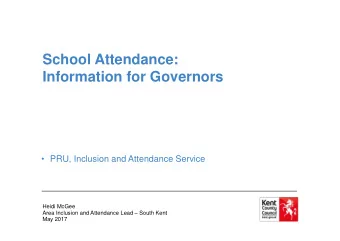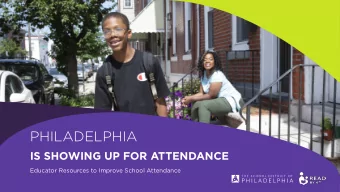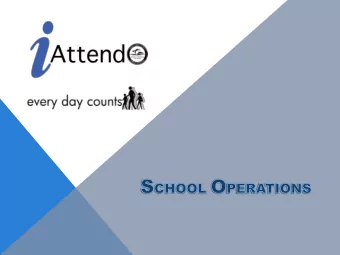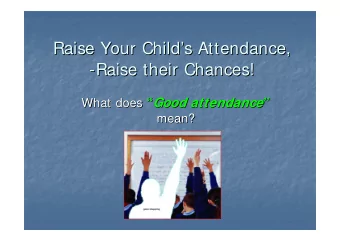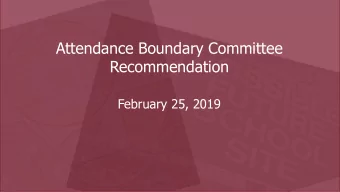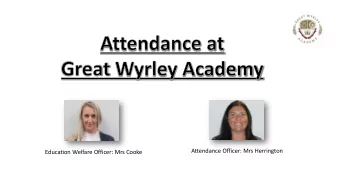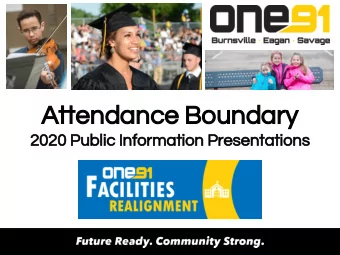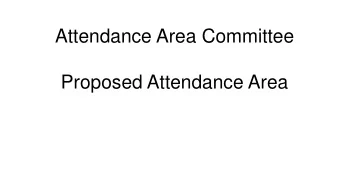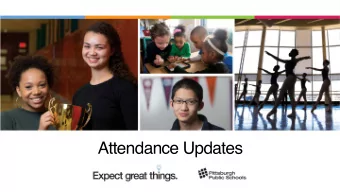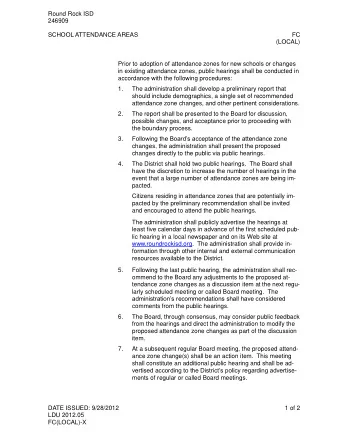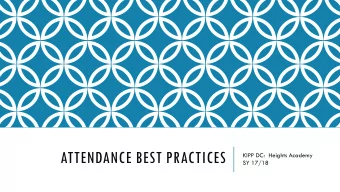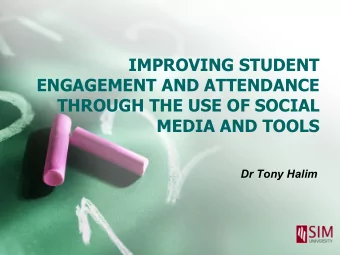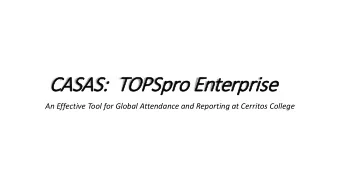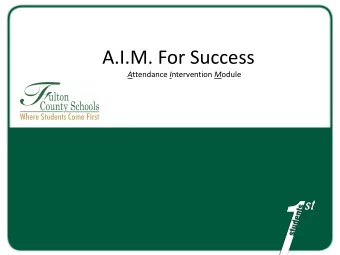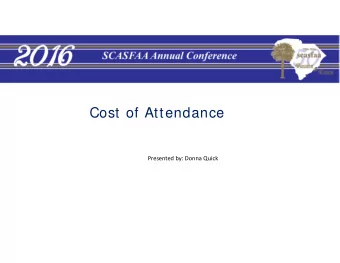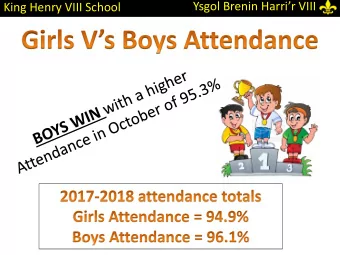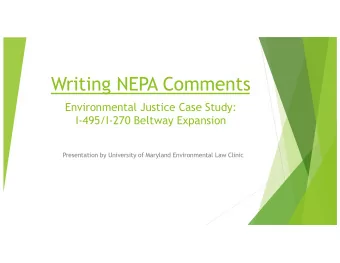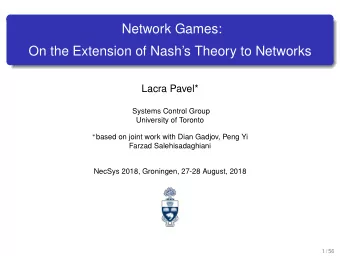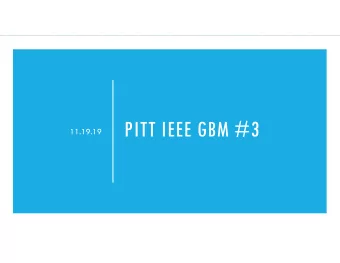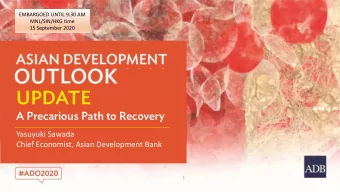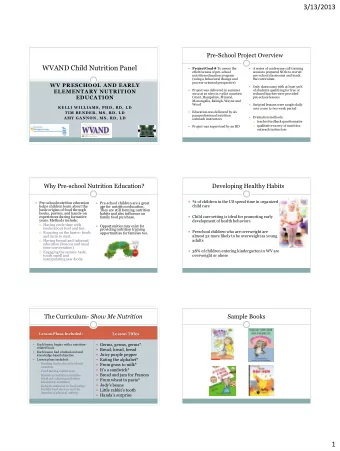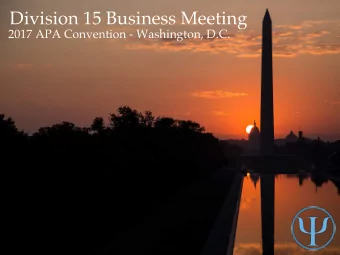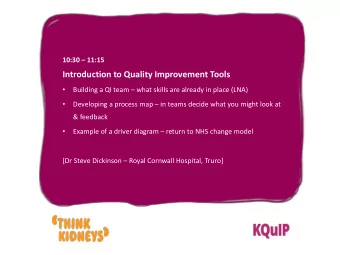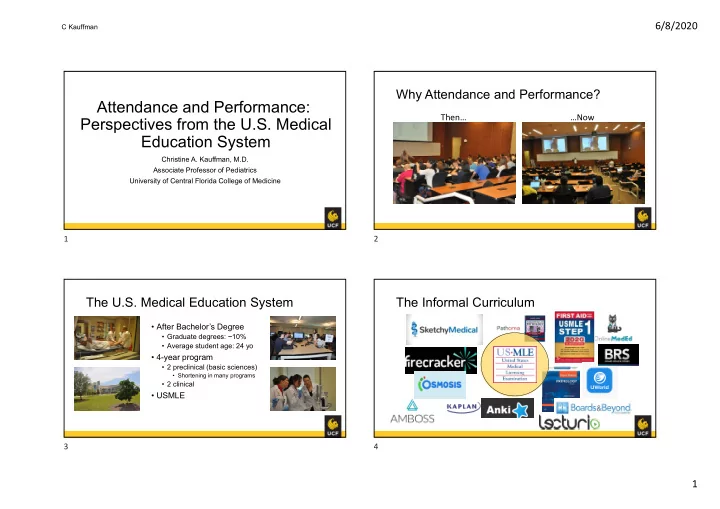
Attendance and Performance: Then Now Perspectives from the U.S. - PowerPoint PPT Presentation
6/8/2020 C Kauffman Why Attendance and Performance? Attendance and Performance: Then Now Perspectives from the U.S. Medical Education System Christine A. Kauffman, M.D. Associate Professor of Pediatrics University of Central Florida
6/8/2020 C Kauffman Why Attendance and Performance? Attendance and Performance: Then… …Now Perspectives from the U.S. Medical Education System Christine A. Kauffman, M.D. Associate Professor of Pediatrics University of Central Florida College of Medicine 1 2 The U.S. Medical Education System The Informal Curriculum • After Bachelor’s Degree • Graduate degrees: ~10% • Average student age: 24 yo • 4-year program • 2 preclinical (basic sciences) • Shortening in many programs • 2 clinical • USMLE 3 4 1
6/8/2020 C Kauffman Adv Physiol Educ42: 593–598, 2018 Adv Physiol Educ43: 512–518, 2019 5 6 Where We Were When COVID Started Preliminary Data From the Lockdown Attendance v Performance 100.00 July August September October November December January February March April May June 95.00 Psychosocial Issues in Healthcare (13 weeks) M1 Orientation 90.00 Cellular Function and Performance (%) Structure and Function (16 weeks) Medical Genetics (8 weeks) Hematology/Oncology Health and Disease (10 weeks) (4 weeks) 85.00 Practice of Medicine including Community of Practice I 80.00 Focused Inquiry and Research Experience I 75.00 Focused Inquiry and Research Experience II M 2 Orientation M 3 Orientation Practice of Medicine including Community of Practice II Int./Fam. Medicine 70.00 Skin and Neurology OB/GYN USMLE STEP 1 Cardiovascular and Endocrine and Gastrointestinal and Musculoskeletal Brain and Behavior Pediatrics Psychiatry 65.00 Pulmonary Systems Reproductive Systems Renal Systems Systems (7 weeks) Surgery (7 weeks) (6 weeks) (6 weeks) (3 weeks) 60.00 0 20 40 60 80 100 Attendance (%) 7 8 2
6/8/2020 C Kauffman Medicine is About People 9 3
6/1/20 P Kumar The six words that … with the undeniable upsurge finally made me of scientific research, we cannot continue to rely on the mere fact that we have o t learned how to teach what is d e e known. We must learn to teach n I o the best attitude to what is not D yet known. ? s i h t w o n k Charles Scott Sherrington (1857-1952) pixabay.com 1. Smells Like Teen Spirit - Nirvana 2. Imagine - John Lennon 3. One - U2 So … can we help our students 4. Billie Jean - Michael Jackson develop constructed knowledge 5. Bohemian Rhapsody - Queen 6. Hey Jude - The Beatles as well as other required 7. Like A Rolling Stone - Bob Dylan graduate attributes? 8. I Can't Get No Satisfaction - Rolling Stones 9. God Save The Queen - Sex Pistols 10.Sweet Child O'Mine - Guns N' Roses redbubble.com 11.London Calling - The Clash understanding 12.Waterloo Sunset - The Kinks 2. How many can you sing off by heart? 13.Hotel California - The Eagles 14.Your Song - Elton John Commitment In Relativism – 15.Stairway To Heaven - Led Zeppelin Constructed Knowledge (knowledge as creative, critically-informed intersection of facts, 16.The Twist - Chubby Checker experience, method)* 17.Live Forever - Oasis 18.I Will Always Love You - Whitney Houston Graduate attributes in HE: Routledge Dualism - Received Knowledge 19.Life On Mars? - David Bowie (knowledge as objective facts)* 20.Heartbreak Hotel - Elvis Presley 1. How many can you sing along to? DR. MICK GRIERSON, UNIVERSITY OF LONDON familiarity The most iconic songs of all time list * Belenky et al, Harper Collins 1986 1
6/1/20 P Kumar The teacher – learner conundrum W e n e e But not like this… d t o s o l v e THEM US • Cheating • To get the • Alienation most learning • Resistance out of the • Corner-cutting students as • Fixation on possible credentials “Industrialised model of a pre-determined, teacher-centric curriculum measured by time in seat and high stakes testing” Susan Blum SUCCESS not LEARNING becomes the goal … Directmedia Publishing The teacher – learner conundrum THEM US e.g. the learning of e.g. learning that a Meaning nonsense syllables: radiator can be very hot baz , ent , nep , arl , lud 0 1 Feeling Relevance Freedom to Learn Are we ‘parents’ or the ‘hired-help’? Rogers 1969 2
6/1/20 P Kumar ACTIVE LEARNING WORKS • more effective learning • better retention of information • better performance in assessments Students need to change their expectations and we need to change how we teach “In the STEMM classroom, should we ask or should we tell?” Freeman et al (2014) PNAS 111 8410-8415 Future-proofing curriculum design and delivery to account for change Students as So what’s stopping participants us? Emphasis on research Emphasis on processes and problems research content “This is a really important article – the impression I get is that it’s almost unethical to be lecturing if you have this Teacher focused: data. It’s good to see such a cohesive picture emerge from their meta-analysis – an abundance of proof that lecturing is outmoded, outdated, and inefficient .” Eric Mazur, Harvard University students as audience news.sciencemag.org Healey (2005) The research-teaching nexus bus gif by eropa 580 3
6/1/20 P Kumar Newton’s First Law an object will remain at rest or in uniform motion in a straight line unless acted upon by an external force It reminded me of the bit in house at Pooh corner “We often miss opportunity because it's dressed in overalls and looks like work” when a nervous piglet asks what would happen if a ― Thomas A. Edison tree fell down when he was beneath it. “Supposing it didn’t ” Pooh replies Nobody said it was gonna be easy It's only as hard as it seems But lately it's harder than usual Am I dreaming impossible dreams? Willie Nelson nicepng.com megatek.com 4
08/06/2020 H Witchel Introduction What and How Do Students Learn • There is no classroom attendance now ! Without Classroom Attendance: Lessons from Lockdown 3 Dr. Harry Witchel • What does the pedagogical literature say? Discipline Lead in Physiology Brighton and Sussex Medical School Advances in Physiology Education PNAS, USA (sometimes) 2 1 2 What is valuable about what What happens in learning happens in the classroom • Adaptive teaching & learning • Rehearsal of retrieval Rapid teacher-to-student feedback Recognising students' confusion and need for clarification Effortful Adapting to students' weaknesses Socratic Q&A • Repetition • Skills learning Repeated reading inefficient Manual skills Communication skills • The idea of effortless • Social learning Joining a community of practise learning is only partially true Peer-to-peer learning Helmholtz Additional social motivation for engagement Salience • "Liveness" Gestures Meaning Body language 3 4 3 4 1
08/06/2020 H Witchel Conclusion: What do we do about Resources for Educators teaching during covid? • Depends on the student • LifeSciTRC Teaching Resource Community Self-efficacy Academic reserve • Lt (ADI Instruments) • Bright and motivated students Petzold, A. M. (2020). Letter to Physiology 2021 the Editor: Resources and Curate Birmingham, UK recommendations for a quick transition to online instruction Education Workshop Answer questions in physiology. Advances in 12 July - 14 July 2021 Teaching skills will require adaptive feedback Physiology Education , 44 (2), 217-219. • Medium students Gannon K . Four Lessons From Moving a Face-to-Face Course Add motivation Online (Online). The Chronicle of Higher Education. Include activities https://www.chronicle.com/ article/4-Lessons-From-Moving- Break the tedium of screen time a/245926 5 6 5 6 2
Recommend
More recommend
Explore More Topics
Stay informed with curated content and fresh updates.
